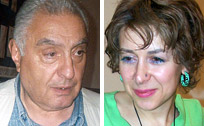The Armenian dram, as President of the Central Bank Tigran Sargsyan says, continues to evaluate. Prices for everything are still going up parallel to the “evaluation”. Perhaps this will be an occasion to come up with a new term in world economics-“Armenian phenomenon”, just like there was a time when there was a new term-“Dutch illness”, which Artashes Geghamyan loves to talk about a lot.
It turns out that parallel to the dram “evaluation”, prices are not only going up for everyday products, but also the price of intellectuals. In any case, the increase of the price of the intellectual was talked about recently during a press conference. Perhaps that is explained by the well-known supply and demand law. You may remember the big scandal that was caused recently when the National Academy of Sciences (NAS) was choosing a reporter. You got the impression that the fight was not for the future development of science or provision of aid, but rather which political party will have more academician members.
Recently, the number of partisans is increasing by 50,000 per week in Armenia. In fact, it has already become quite “stylish” to have political parties update information regarding the number of members and present this or that piece of information about their quality. In other words, they present how many of their partisans are candidates and/or doctors of sciences, academicians and other people with rankings. Thus, this is what has led up to “raising the price of the intellectual”. But nobody can claim that a certain party’s abundance of intellectuals means that it has a high reputation. For example, poet David Hovhannes “detests” partisan artists. This is what he announced on Friday during a press conference at the “Hayeli” club. Poetess Violet Grigoryan believes that perhaps the authorities often do what was done during the Soviet era, when the authorities used to take advantage of people with a reputation, or people who seemed to have a reputation and artists to speak out about their preferred topics and ideas.
“If society stops expecting someone to come, give a lecture, propose all the solutions and have the writer talk profusely and tell the truth…, if that illusion fades away, then the authorities won’t use the intellectual, the intellectual won’t serve or back the authorities,” said V. Grigoryan. As for poet David Hovhannes, he says that the “mantle, the cape and apostleship of a leader or prophet must be taken off” of the intellectual’s shoulders”. “Perhaps it was given to the USSR at the time and it still goes on with inertia,” he says.
According to D. Hovhannes, the intellectual doesn’t have the voice to speak out when it comes time to approve resolutions and even if heard, the resolutions aren’t approved based on the intellectual’s voice. Grigoryan only accepts the intellectual’s and artists’ oppositional approach towards the authorities and the criticism must be aimed towards becoming healthy criticism.
“The intellectuality is part of the people and it doesn’t depend on whether it reaches out to the people and the authorities or not. If intellectuals truly express their thoughts and opinions, that will be public opinion. I don’t understand how, for example, leaders of creative unions can be authorized to speak on behalf of the members of the given union. For example, the President of the Writers’ Union of Armenia makes an impromptu announcement and expresses the opinion of the Writers’ Union. This is what it means to take advantage secretly,” says V. Grigoryan.
As for David Hovhannes, he believes that the people are always right, even when they are not.
“Opposition is always part of the artist’s character. I’m talking about the artist, not the person that is used,” mentioned Hovhannes and added: “In the current conditions of Armenia, the creative unions are absolutely temporary and anachronistic phenomena.”
D. Hovhannes compared today’s Armenian creative unions with “needy institutions”. Interesting: in that case, why do people become members of those unions?
“It continues with inertia. Apparently, it’s easier to work with creators when they are grouped together in a union, not to say that they are easier to manipulate ….but why shouldn’t I say it? They are easier to work with when they go hand-in-hand, especially in these days when the writer or artist goes along with his miserable state of being and it seems as if those unions have turned into a hang-out spot, or needy institutions. Perhaps some people, including writers, benefit from having this kind of a union so that they can go and solve this or that issue… Currently, creative unions mainly solve domestic issues. As for me, I’m part of that union with the same inertia. If one day the union disbands, I won’t feel any difference,” announced poet David Hovhannes.
In reference to the assassination of Hrant Dink, D. Hovhannes mentioned that Hrant Dink was the person whom everyone had “divergent opinions” about before his assassination.
“There were people (I was not one of them), who didn’t accept his approach on the law passed in France penalizing anyone who denies the Armenian Genocide; Dink was against dispersing the genocide issue around the world. He believed that that only stands in the way of Turkish-Armenian dialogue,” said D. Hovhannes.
P.S. In fact, the bill constituting penalization for denial of the Armenian Genocide is still not in effect as a law in France. The bill must still be passed by the other French parliamentary chamber and signed by the French President. But that will only happen when France has the desire to pressure Turkey a little.

